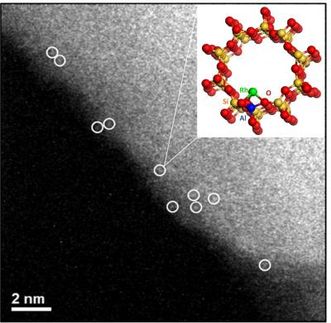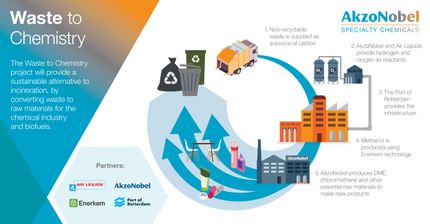With quantum chemistry and prominent investors to green methanol
Berlin-based start-up aims to make the chemical industry more sustainable and less dependent on fossil imports
The Climate tech start-up C1 has raised growth capital from well-known investors. Led by green tech investor Planet A Ventures, the investors include Paua Ventures and experienced industry managers. These include Dr. Jürgen Hambrecht, formerly CEO and chairman of the supervisory board of BASF, Prof. Wolfgang Reitzle, most recently chairman of the supervisory board of Linde, and Jim Hagemann Snabe, chairman of the supervisory board of Siemens.

Symbolic image
pixabay.com
"Our goal is to make the chemical industry less dependent on oil, gas and coal. In doing so, we have to become much faster. We are basically producing methanol today as we did 100 years ago, importing fossil fuels to do so," explains CEO Christian Vollmann. The team around renowned chemist and co-founder Dr. Marek Checinski applies high-performance computer simulation to achieve this.
"That's a big advantage. Until now, innovations in the chemical industry have taken quite a long time because they were largely based on conventional experiments. Quantum chemistry is opening a new chapter here and becoming more important as computing power increases. This makes it possible to develop chemical processes that would have been impossible to conceive of just a few years ago," says former BASF CEO and C1 Supervisory Board member Dr. Jürgen Hambrecht, describing his involvement.
The first chemical process that C1 has developed using its technology platform is a much more efficient and sustainable process for producing methanol. The alcohol has been an important basic material in the chemical industry since the beginning of industrialization. C1 technology allows non-fossil methanol to be produced from excess biomass, waste plastic, or CO2 and H2. The key is a highly effective catalyst that makes the necessary chemical reaction much more efficient. It makes green methanol economical after all. And it also makes a different plant design possible:
"Until now, methanol has been produced in a few, gigantic plants. C1 technology, on the other hand, allows small, decentralized plants. This allows us to go where CO2 is a waste product and renewable energy is available for the process," says Jan Christoph Gras, partner at Planet A Ventures. Another advantage that makes green methanol interesting for other industries as well.
One example is shipping, which cannot be electrified and relies on green methanol as a climate-friendly propulsion alternative. "The first ships will set out to sea in 2024. Demand will exceed supply for years to come. C1's technology will reduce the green premium and accelerate the production ramp-up of green methanol," says Jim Hagemann Snabe, former chairman of the board of Maersk, the world's largest shipping company, which has already ordered 12 container ships powered by methanol.
"Achieving our climate goals critically depends on whether we manage to establish closed carbon cycles in our industrial value chains. I have seen many ideas to this end, but few have convinced me so far. C1 can make a valuable contribution here because they get to the root of the problem, namely the raw materials, and have a highly scalable technology," says Prof. Wolfgang Reitzle, explaining his investment in C1.
Most read news
Organizations
Other news from the department business & finance

Get the chemical industry in your inbox
By submitting this form you agree that LUMITOS AG will send you the newsletter(s) selected above by email. Your data will not be passed on to third parties. Your data will be stored and processed in accordance with our data protection regulations. LUMITOS may contact you by email for the purpose of advertising or market and opinion surveys. You can revoke your consent at any time without giving reasons to LUMITOS AG, Ernst-Augustin-Str. 2, 12489 Berlin, Germany or by e-mail at revoke@lumitos.com with effect for the future. In addition, each email contains a link to unsubscribe from the corresponding newsletter.
Most read news
More news from our other portals
Something is happening in the chemical industry ...
This is what true pioneering spirit looks like: Plenty of innovative start-ups are bringing fresh ideas, lifeblood and entrepreneurial spirit to change tomorrow's world for the better. Immerse yourself in the world of these young companies and take the opportunity to get in touch with the founders.

























































